Efficient job search.
natural networking.
simple interviews.
Use neuroscience to show your value
The Rules for finding a job have changed
How do you position yourself in the job market?
How do you navigate job interviews without lying or rambling?
How do you negotiate your salary without getting job offers pulled?
The biggest uncertainty of all?
"Who will actually help me?"
Friends and family want what's best for you, but they don't know today's market.
Anyone can say they're a Career Coach and charge money for their advice.
Do you go it alone? Learn from sources online?
You may have seen my content on LinkedIn.
You can learn a lot from it, and it's all free.
But if you work with me personally, your growth becomes my top priority.
Not just finding your next job.
Making sure your job search is never as tiring as it was this time.
How will we do that?
I have a background in Neuroscience.
That's not to brag, but to show you what I care about.
I care about precision.
I care about cutting through noise.
I care about helping you Change your brain.
Together, we'll upgrade your professional influence:
Network without being aggressive or desperate.
Show up with confidence in job interviews.
Negotiate your salary with empathy.
Live without stress overload.
Here are some of my coaching stats:
80+ satisfied clients.
+953% average return on investment.
5-Star ratings on LinkedIn and Google.
The rules for finding a job have changed
How do you position yourself in the job market?
How do you navigate job interviews without lying or rambling?
How do you negotiate your salary without getting job offers pulled?
The biggest uncertainty of all?
"Who will actually help me?"
Friends and family want what's best for you, but they don't know today's market.
Anyone can say they're a Career Coach and charge money for their advice.
Do you go it alone? Learn from sources online?
You may have seen my content on LinkedIn.
You can learn a lot from it, and it's all free.
But if you work with me personally, your growth becomes my top priority.
Not just finding your next job.
Making sure your job search is never as tiring as it was this time.
How do we do that?
I have a background in Neuroscience.
That's not to brag. It's to show you what I care about.
I care about precision.
I care about cutting through noise.
I care about helping change your brain.
Together, we'll upgrade your professional influence:
Network without being aggressive or desperate.
Show up with confidence and integrity in job interviews.
Negotiate your salary with empathy.
Live without stress overload.
Here are some of my coaching stats:
80+ satisfied clients.
+953% average return on investment.
5-Star ratings on LinkedIn and Google.
affordable Services
1 : 1 Career Coaching
Job Search Strategy
$149 / session
Craft a custom strategy to get traction in the toughest job market
Learn effective Networking Strategies on LinkedIn and in person
Learn the latest tactics to optimize your resume
Diagnose potential pitfalls for you
Learn how to avoid job search burn out
Includes 1 personal Coaching Session (45-minutes, by Zoom)
Bonus "Reverse Lottery" Job Search Strategy Guide

1% of your payment helps remove CO₂
from the atmosphere.
Job Interview Mastery
$399 Total
Learn the "Reverse Interviewing" method to impress interviewers without being fake
Craft the 5 universal stories you'll actually enjoy telling (in every interview)
Get the 4-step "Self-Labeling" professional headline formula
Includes 2 personal Coaching Sessions (45-minutes each, by Zoom)
Bonus 12-page "Reverse Interviewing" EBook (super concise, 0% fluff)
Bonus 6-step Checklist (includes tips for using AI to prepare)

1% of your payment helps remove CO₂
from the atmosphere.
Leadership Coaching
For Managers → VPs
Convince leadership to raise your salary
Find out what you need to get promoted
Learn what's blocking your progress
Advanced negotiation training

1% of your payment helps remove CO₂
from the atmosphere.
Client Testimonials
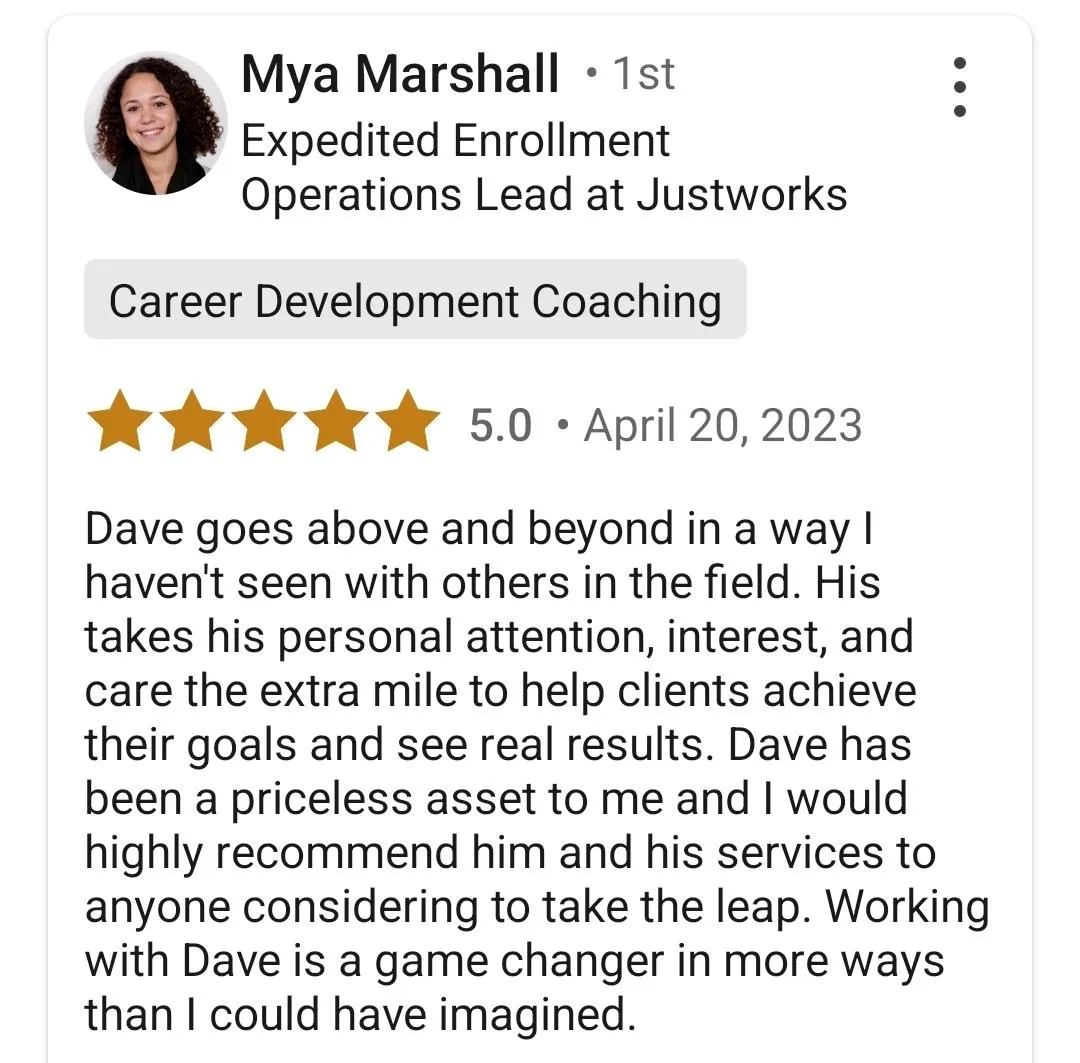

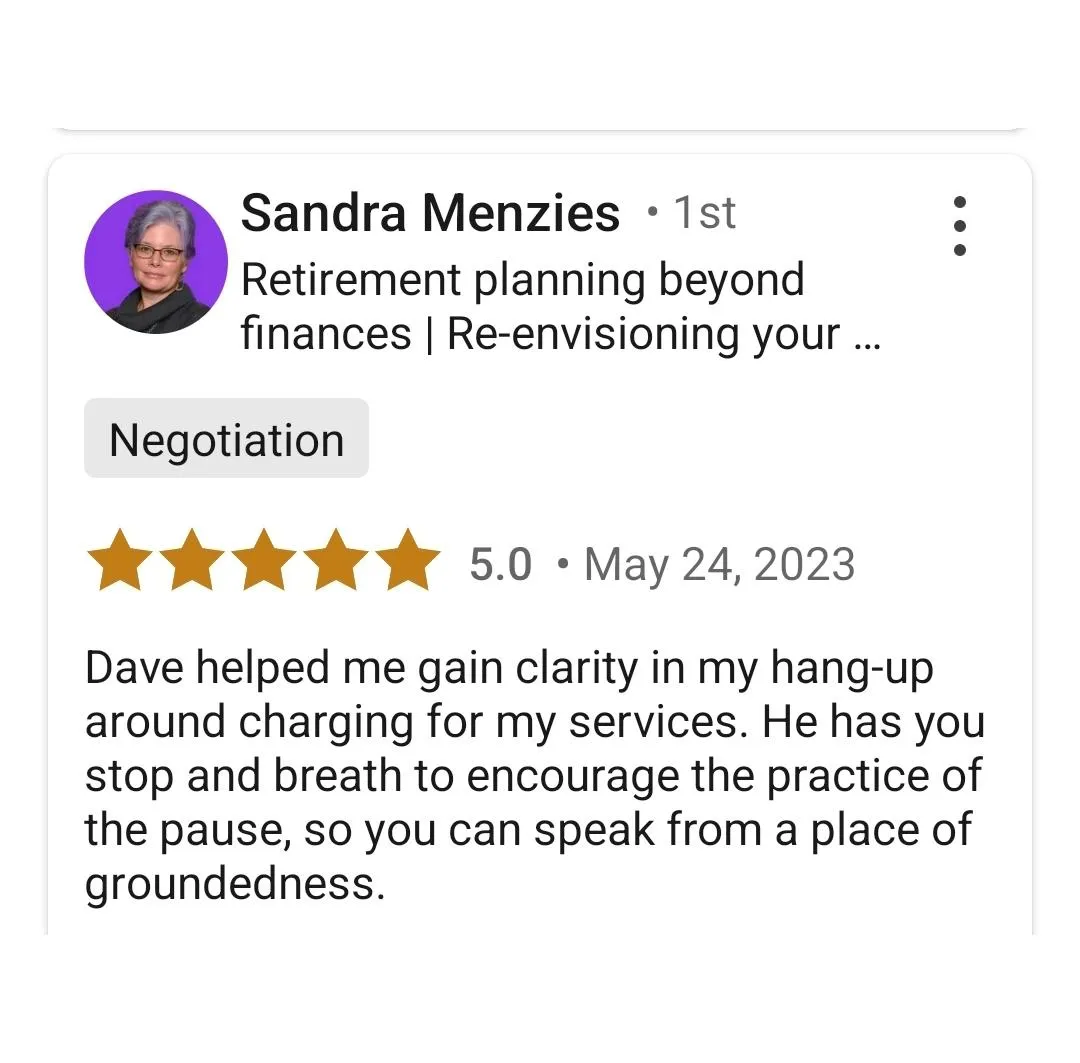
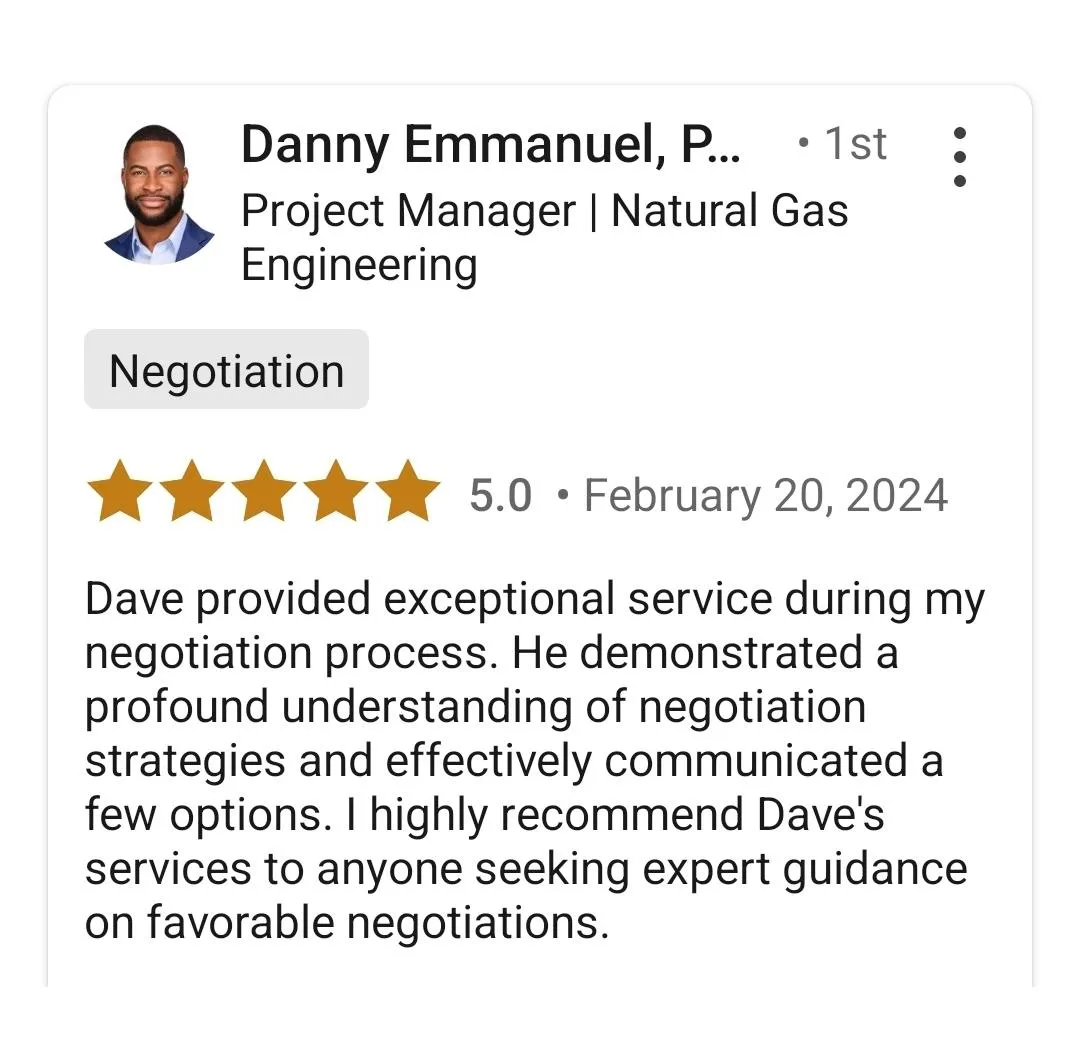

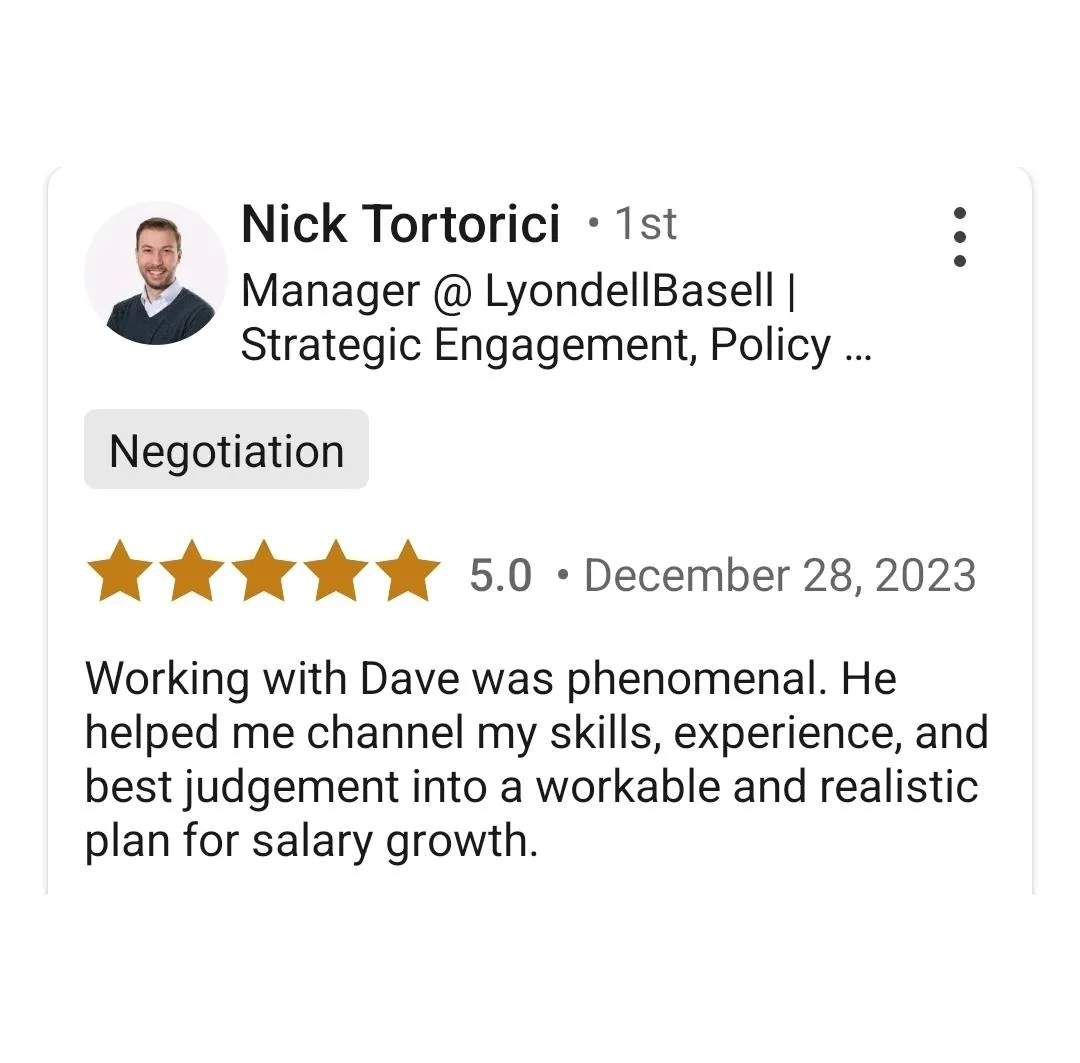
(More Testimonials Below)
Meet Your Coach
Dave Wolovsky

I was home schooled until 13 years old.
Always a quiet introvert.
Overly sensitive to others' discomfort.
I was scared to ask for things.
Waited for others to offer.
Waited and waited.
After a horrible job experience...
⚠️ Strangled by my own anxiety.
⚠️ Desperate to impress my bosses.
⚠️ "Stuck it out" until I got physically ill.
I realized I needed to grow as a person.
To ask for what I needed.
To persuade with empathy.
To negotiate without conflict.
I dove deep into understanding people:
▪︎ Neuroscience (got a masters in it)
▪︎ Positive psychology (a certification)
▪︎ Negotiation (books, courses, teaching).
Then I realized lots of people had difficulties like me.
And I became committed to helping people get paid what they're worth.
An early client got a $35k raise, while cutting back to a 4-day workweek.
I thought, "this is interesting."
I wrote down everything we did.
Conversations along the way.
The mistakes along the way.
I created a set of principles.
Called it "Empathic Influence & Negotiation."
Applied it to salary negotiations.
Applied it to job interviews.
Applied it to networking.
And then I found Mindfulness.
That added some next level juice.
I created the "Mindful Sprint" process.
And now I help talented introverts become Mindful Sprinters.
This kind of personal growth creates:
✓ Better job opportunities.
✓ Higher compensations.
✓ Stronger boundaries.
Without creating:
🚫 Confrontational situations.
🚫 Resentful relationships.
🚫 Suffocating stress.
We navigate social complexities:
▪︎ Being a team player, not a pushover.
▪︎ Asking for a raise collaboratively.
▪︎ Making your value fully visible.
With me, you're not getting an extroverted former CEO.
I won't insist that you have to "command the room."
You ARE getting a partner to help you:
▪︎ Shine a floodlight on your value.
▪︎ Stay authentically introverted.
▪︎ Meet you where you're at.
Expect to be empowered:
▪︎ Do things you've never done before.
▪︎ Learn the science of negotiation.
▪︎ Experience true mindfulness.
Additional Client Testimonials

Career Coaching: job search and Career Growth
© 2025 David Wolovsky | All Rights Reserved
This website is not part of the Facebook website or Facebook Inc. Additionally, this site is not endorsed by Facebook in any way. Facebook is a trademark of Facebook, Inc.
Complete details for Facebook’s legal terms are are available at:
https://www.facebook.com/legal/terms
All Facebook policies are available at:
https://www.facebook.com/policies/
Client Testimonials
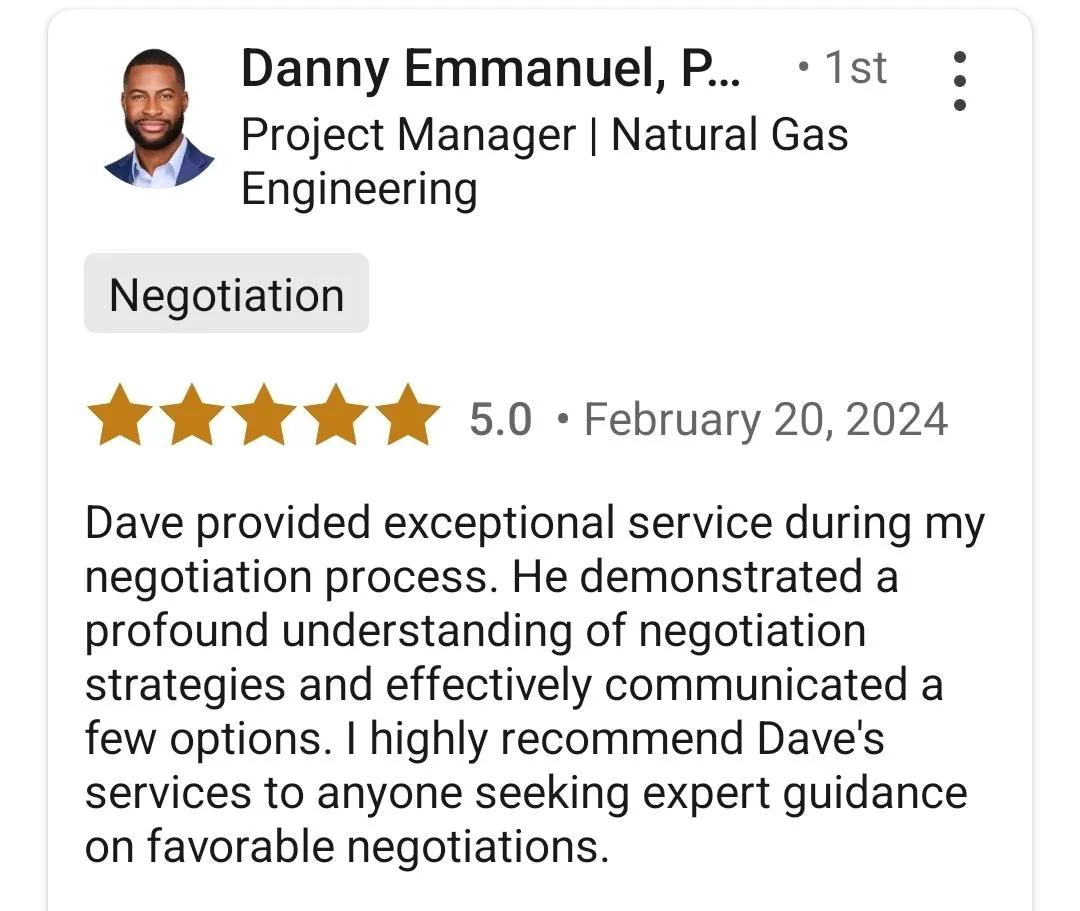

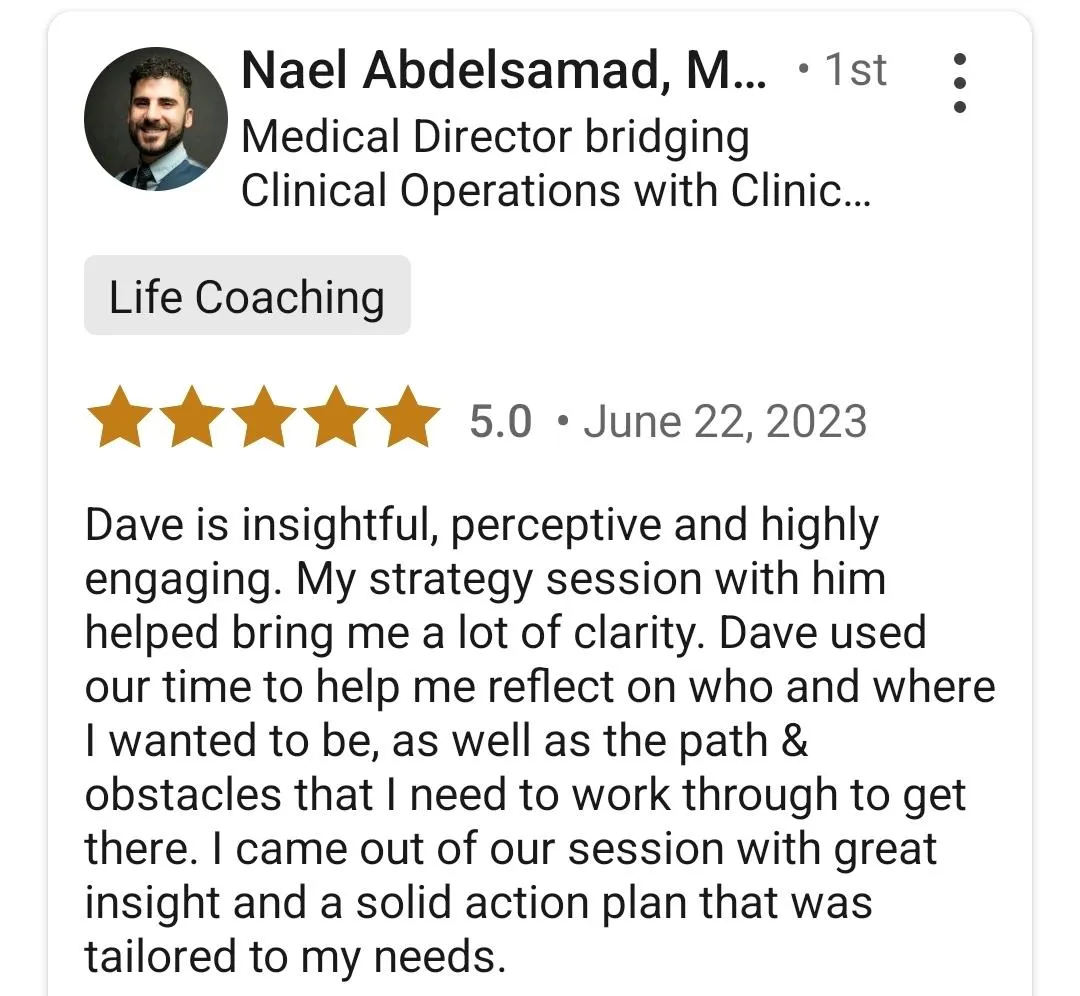
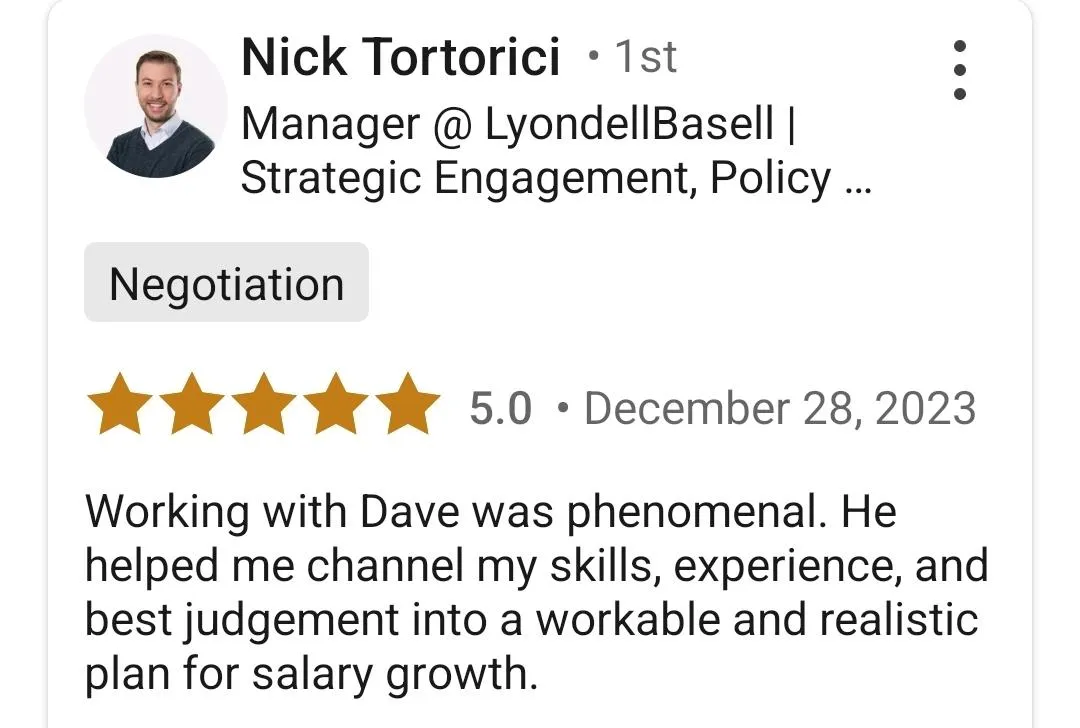

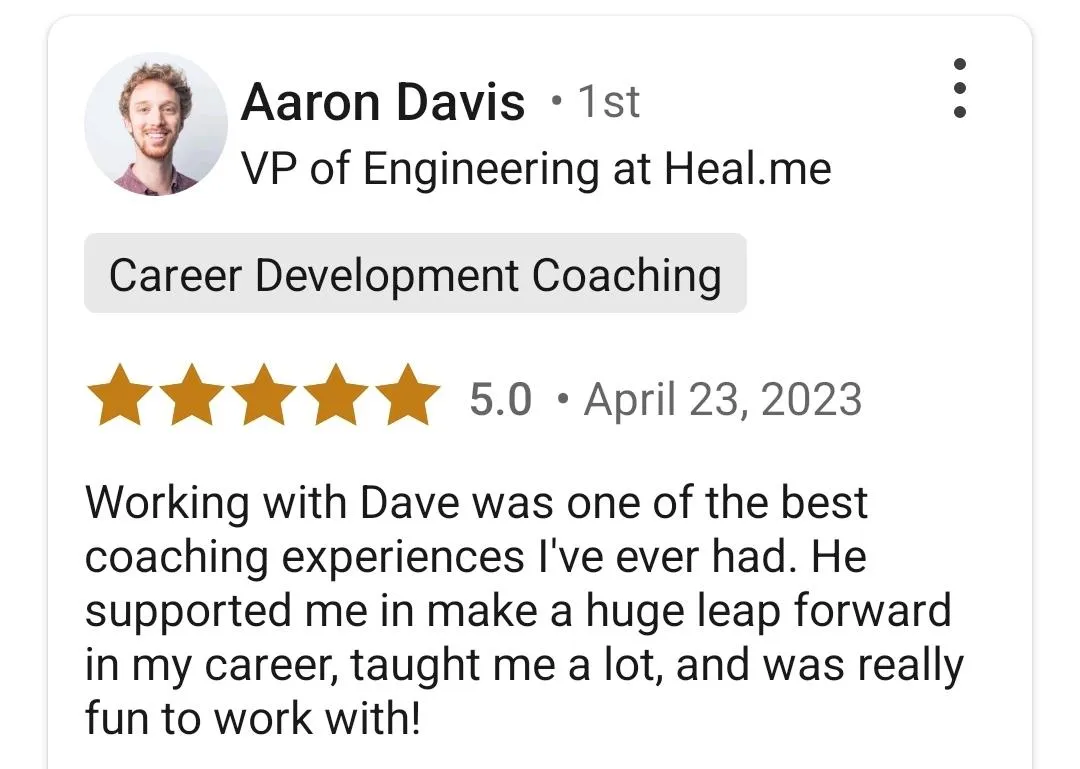
(More Testimonials Below)
Meet Your Coach:
Dave Wolovsky

I was home schooled until 13 years old.
Always a quiet, empathic introvert.
Overly sensitive to others' discomfort.
I was scared to ask for things.
Waited for others to offer.
Waited and waited.
After a horrible job experience...
⚠️ Strangled by my own anxiety.
⚠️ Desperate to impress my bosses.
⚠️ "Stuck it out" until I got physically ill.
I realized I needed to grow as a person.
To ask for what I needed.
To persuade with empathy.
To negotiate without conflict.
I dove deep into understanding people:
▪︎ Neuroscience (got a masters in it)
▪︎ Positive psychology (a certification)
▪︎ Negotiation (books, courses, teaching).
Then I realized lots of people had difficulties like me.
And I became committed to helping people get paid what they're worth.
An early client got a $35k raise, while cutting back to a 4-day workweek.
I thought, "this is interesting."
I wrote down everything we did.
Conversations along the way.
The mistakes along the way.
I created a set of principles.
Called it "Empathic Influence & Negotiation."
Applied it to salary negotiations.
Applied it to job interviews.
Applied it to networking.
And then I found Mindfulness.
That added some next level juice.
I created the "Mindful Sprint" process.
And now I help talented introverts become Mindful Sprinters.
This kind of personal growth creates:
✓ Better job opportunities.
✓ Higher compensations.
✓ Stronger boundaries.
Without creating:
🚫 Confrontational situations.
🚫 Resentful relationships.
🚫 Suffocating stress.
We navigate workplace complexities:
▪︎ Being a team player, not a pushover.
▪︎ Asking for a raise collaboratively.
▪︎ Making your value fully visible.
With me, you're not getting an extroverted former CEO.
I won't insist that you have to "command the room."
You ARE getting a partner to help you:
▪︎ Shine a floodlight on your value.
▪︎ Stay authentically introverted.
▪︎ Meet you where you're at.
Expect to be empowered:
▪︎ Do things you've never done before.
▪︎ Learn the science of negotiation.
▪︎ Experience true mindfulness.

Career Coaching: job search and Career Growth
© 2025 David Wolovsky | All Rights Reserved
CNBC Article" Link Here
This website is not part of the Facebook website or Facebook Inc. Additionally, this site is not endorsed by Facebook in any way. Facebook is a trademark of Facebook, Inc.
Complete details for Facebook’s legal terms are are available at:
https://www.facebook.com/legal/terms
All Facebook policies are available at:
https://www.facebook.com/policies/
